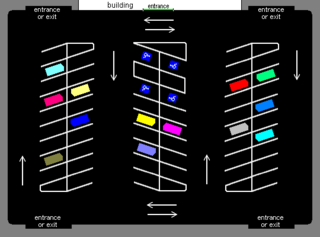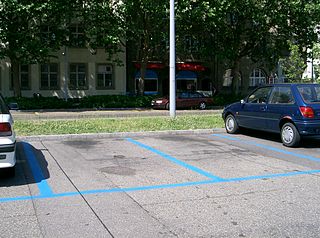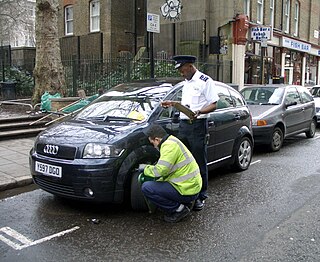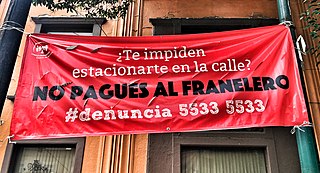
Parking is the act of stopping and disengaging a vehicle and usually leaving it unoccupied. Parking on one or both sides of a road is often permitted, though sometimes with restrictions. Some buildings have parking facilities for use of the buildings' users. Countries and local governments have rules for design and use of parking spaces.

A parking lot or car park, also known as a car lot, is a cleared area intended for parking vehicles. The term usually refers to an area dedicated only for parking, with a durable or semi-durable surface. In most jurisdictions where cars are the dominant mode of transportation, parking lots are a major feature of cities and suburban areas. Shopping malls, sports stadiums, and other similar venues often have immense parking lots.

A wheel clamp, also known as wheel boot, parking boot, or Denver boot, is a device that is designed to prevent motor vehicles from being moved. In its most common form, it consists of a clamp that surrounds a vehicle wheel, designed to prevent removal of both itself and the wheel.

Valet parking is a parking service offered by some restaurants, stores, and other businesses. In contrast to "self-parking", where customers find a parking space on their own, customers' vehicles are parked for them by a person called a valet. This service either requires a fee to be paid by the customer or is offered free of charge by the establishment.
Double parking refers to parking parallel to a car already parked at the curb or double parking in attended car parks and garages.

A parking space, parking place or parking spot is a location that is designated for parking, either paved or unpaved. It can be in a parking garage, in a parking lot or on a city street. The space may be delineated by road surface markings. The automobile fits inside the space, either by parallel parking, perpendicular parking or angled parking.

A parking enforcement officer (PEO), traffic warden, parking inspector/parking officer, or civil enforcement officer is a member of a traffic control agency, local government, or police force who issues tickets for parking violations. The term parking attendant is sometimes considered a synonym but sometimes used to refer to the different profession of parking lot attendant.

Motor vehicle registration is the registration of a motor vehicle with a government authority, either compulsory or otherwise. The purpose of motor vehicle registration is to establish a link between a vehicle and an owner or user of the vehicle. While almost all motor vehicles are uniquely identified by a vehicle identification number, only registered vehicles display a vehicle registration plate and carry a vehicle registration certificate. Motor vehicle registration is different from motor vehicle licensing and roadworthiness certification.

Decriminalised parking enforcement (DPE) is the name given in the United Kingdom to the civil enforcement of car parking regulations, carried out by civil enforcement officers, operating on behalf of a local authority. The Road Traffic Act 1991 (c. 40) provided for the decriminalisation of parking-related contraventions committed within controlled parking zones (CPZ) administered by local councils across the UK. The CPZs under the control of the local councils are also referred to as yellow routes and they can be easily identified with yellow lines marked on the roads with relevant time plates. Councils employ parking attendants to enforce their CPZs directly.

A parking violation is the act of parking a motor vehicle in a restricted place or in an unauthorized manner. It is against the law virtually everywhere to park a vehicle in the middle of a highway or road; parking on one or both sides of a road, however, is commonly permitted. However, restrictions apply to such parking, and may result in an offense being committed. Such offenses are usually cited by a police officer or other government official in the form of a traffic ticket.

A disabled parking permit, also known as a disabled badge, disabled placard, handicapped permit, handicapped placard, handicapped tag, and "Blue Badge" in the European Union, is a permit that is displayed upon parking a vehicle. It gives the operator of a vehicle permission to special privileges regarding the parking of that vehicle. These privileges include parking in a space reserved for persons with disabilities, or, in some situations, permission to park in a time-limited space for a longer time, or to park at a meter without payment.

Towing is coupling two or more objects together so that they may be pulled by a designated power source or sources. The towing source may be a motorized land vehicle, vessel, animal, or human, and the load being anything that can be pulled. These may be joined by a chain, rope, bar, hitch, three-point, fifth wheel, coupling, drawbar, integrated platform, or other means of keeping the objects together while in motion.

In Singapore, cars and other vehicles drive on the left side of the road, as in neighbouring Malaysia, due to its British colonial history. As a result, most vehicles are right-hand drive. However, exemptions have been made to allow foreign vehicles and construction machineries to utilise the road space of Singapore. As such, vehicles with left hand drive configurations are required to either be driven with a sign indicating "LEFT-HAND-DRIVE" or towed.

Vehicle impoundment is the legal process of placing a vehicle into an impoundment lot or tow yard, which is a holding place for cars until they are placed back in the control of the owner, recycled for their metal, stripped of their parts at a wrecking yard or auctioned off for the benefit of the impounding agency.

Franeleros are people who have as main activity guarding or keeping an eye on cars parked in several streets in certain places in large Mexican cities, getting a tip as a reward, which sometimes is established by them. The term comes from the Spanish word franela, meaning flannel, which is a small piece of soft light fabric which they use to wash the cars if they are asked to, or to simply wave it around to give parking indications. Franeleros are sometimes also known as cuida-coches or "viene vienes", which is the phrase they commonly say while giving the parking indications. In 2007, due to the criticisms around this controversial "occupation" this guarding activity became illegal in Mexico City, but it is still widely practiced. In areas where parking meters have been installed, franeleros no longer operate.

Start and park is a term used in auto racing, particularly in NASCAR-sanctioned races, to describe the practice of racing teams starting races but pulling the car off the track after just a few laps in order to collect prize money while avoiding expenses such as replacement tires, engine wear and tear, and hiring a pit crew. The practice has existed due to the relatively high purse for even a back-of-the-pack finish, as well as the high costs of fielding a car for an entire race. While start-and-park entries occasionally act as "field fillers", the practice is criticized in instances when they take spots away from teams intending to run the full race.
The British Parking Association Limited (BPA), is a British-based trade association that focuses on parking and traffic management fields. The association is a company limited by guarantee, and non-profit organisation founded in 1968, though was not registered until 1970.
Parking in Mexico City is a mix of street parking controlled by franeleros or parking space holders, but in some areas meters have been introduced. According to a survey by IBM, Mexico City had North America's worst parking and tied for 10th worst in the world, to IBM's survey, with 73 per cent of drivers in Mexico City having had to abandon their search for parking at some point during the previous 12 months.

A car guard is an informally employed person in charge of finding parking spots for cars and ensuring the safety of those cars until their owners return. These self-employed individuals often charge a nominal fee. They may euphemistically be called parking attendants or parking assistants.
Trapito is the Argentinian term for an extortionist who runs a protection racket in which they ostensibly guard parked cars, while actually vandalizing or stealing the cars of those who refuse to pay.

















